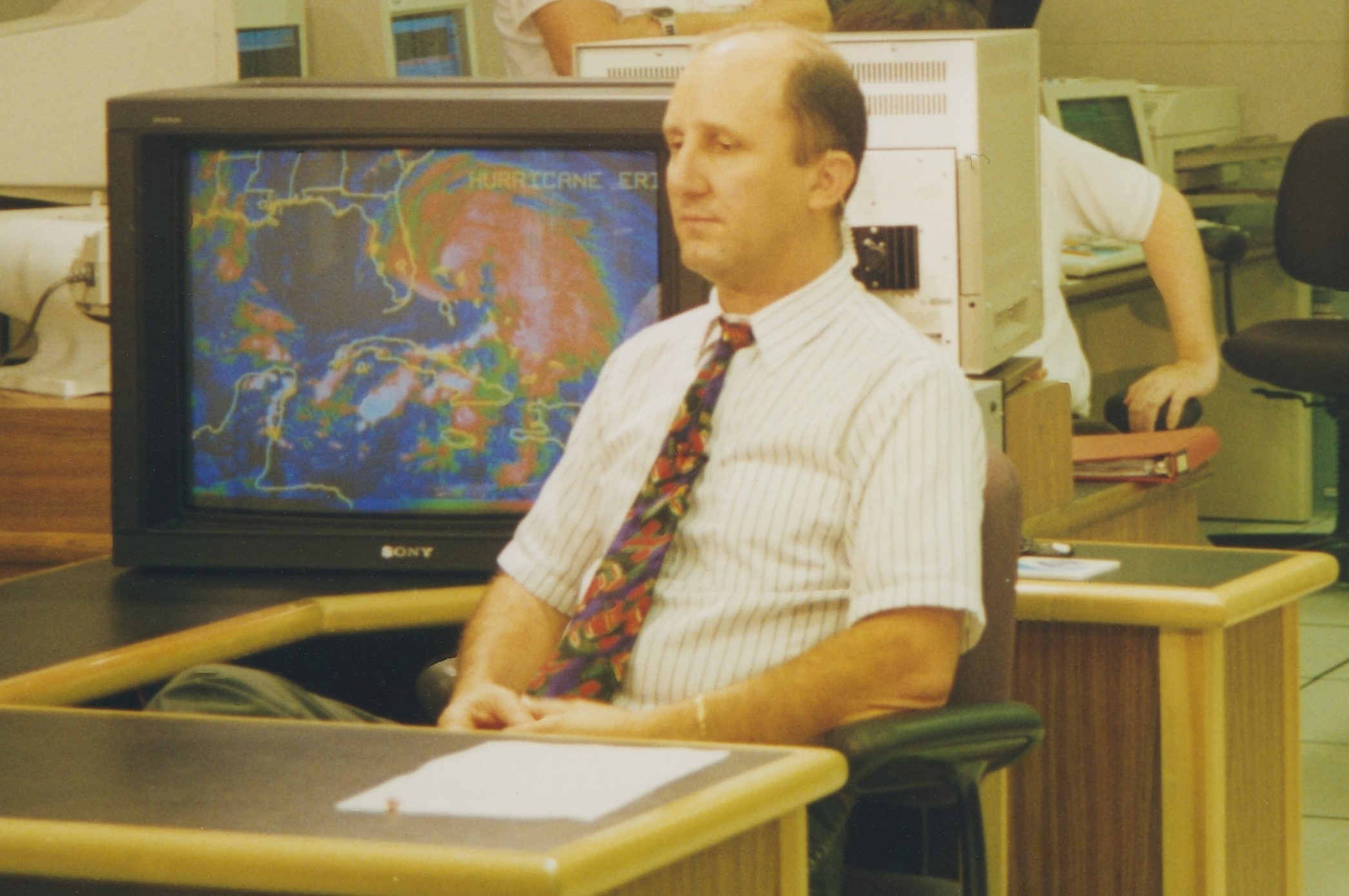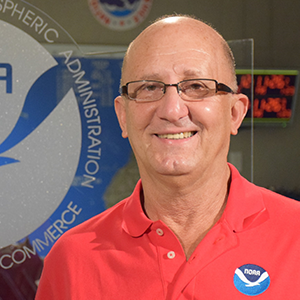Dr. Lixion Avila
Location: Miami, FL
Office: NOAA’s National Hurricane Center
Job Title: Senior Hurricane Specialist (Retired)
|
|
|
Dr. Lixion Avila discusses the latest advisory for Hurricane Earl while Max Mayfield and Jerry Jarrell look on, September 2, 1998, during a coordination conference call.
|
|
|
|
Dr. Lixion Avila seated at the ASOS stations in the NHC hurricane forecast operations area, circa 1988.
|
 |
| Dr. Lixion Avila provides a Spanish-language television interview as Hurricane Erin threatens the Southeast U.S., August 1, 1995 |
What is your educational background:
- Bachelor of Science degree in Meteorology from University of Havana (1973)
- Master of Science in Atmospheric Science from University of Miami (1983)
- Doctorate Degree in Atmospheric Science from University of Miami (1993)
Describe the career path that led you to your current job with the National Weather Service.
- I love hurricanes because I grew up on the beach, watching the waves and the wind blowing. Cuba is an island that is affected by hurricanes. Now, I've realized the dream of becoming a hurricane specialist at the National Hurricane Center, which is the top hurricane office in the world. I am so glad I was able to do that.
- I began my professional career in 1973 as a meteorologist with the Cuban Weather Service, providing hurricane forecast and warning information. I was a consultant to the National Hurricane Center from 1983 to 1987, providing warning information in Spanish for the radio and television press. I joined the National Hurricane Center as a meteorologist in 1987, and became a hurricane specialist in 1989.
Was it luck, good fortune, or did you know someone in the NWS?
- It’s a combination. I am thankful to Paul Hebert and Neil Frank for the rest of my life. They adopted me at the hurricane center when I was a student at the University of Miami. They found little projects for me to do. It was John Hope, it was Gil Clark, it was Bob Case and Miles Lawrence - they all somehow adopted me. They really trained and prepared me.
What do you do for the NWS?
- As a Senior Hurricane Specialist for the National Hurricane Center, I issue track, intensity, and wind radii forecasts, as well as associated watches and warnings for tropical cyclones in the Atlantic and eastern North Pacific Oceans.
What advice do you have for someone interested in a career with the NWS or a career in meteorology?
- Don’t be pompous. The atmosphere always has a surprise for you. And that’s something that I learned from Gordon Dunn. When we were in the old building in Coral Gables, he would come in every morning to look at the map with a little Coca-Cola in his hand and ask about my forecast. He said you’re a humble man because you know that hurricanes are going to do what they want to do. As long as you think that, you’ll be a great forecaster.
10 years ago, you said you’d keep doing this as long as you’re still having fun. Have you reached that point?
- Well, that’s why my retirement has been a difficult decision. Yes, I am still having fun, However, I’m 69 years old, I've worked for so many years and I want to have some fun in addition to what I had here. It’s time to go.
NHC receives a lot of positive comments about your hurricane discussions. What makes yours unique?
- I’ve written more advisories and more discussions than anyone in the history of the hurricane center. I was trained by Neil Frank, Max Mayfield and Bob Sheets. They told me if your discussion is not understood by your grandmother, it’s useless.
What would you consider a good day?
- For me, it’s when there’s a beautiful hurricane out there, moving through the Atlantic basin and not affecting anyone. One that was well forecast of course.
What’s a bad day?
- Those storms that are difficult to forecast, that are not well structured and hard to find the center, even if we have a plane investigating.
Looking back at your career, is there something you didn’t do that you wish you would have?
- No. If I was young again, I would want to do exactly what I did, which is work for the National Hurricane Center, save peoples’ lives and help the Caribbean countries.
What are you going to miss?
- The first visible satellite picture in the morning when I come in, especially in the summertime during the hurricane season. And the scientific discussions with my coworkers. We all are like family and we have a very good combination of characters in here, and I love it.
What won’t you miss?
- The midnight shifts! They are something that were so normal 25-30 years ago. But at my age, it’s difficult.
When the hurricane center is in your rearview mirror, what are going to be doing?
- The first couple months, I don’t know if I will be crying because I miss the hurricane center or having fun, but I want to relax. And if I am healthy and have the strength, I would love to help the Caribbean countries during the hurricane season, be it through the WMO or another agency, and contribute to the knowledge of hurricanes to the people of the Caribbean.
Anything else you’d like to add?
- It’s been the most beautiful years of my life and I will never regret for a second that I worked for the best hurricane center in the world.
Addendum:
- Dr. Avila was awarded the National Hurricane Conference Outstanding Achievement Award (1999), the NOAA Administrator’s Award for Public Education (2000), the Bronze Medal Unit Award for Superior Federal Service (2000), and the National Weather Service Isaac M. Cline National Award for Outreach (2005). He is a Fellow with the American Meteorological Society. Dr. Avila has been nominated twice for an Emmy Award for his participation in a hurricane preparedness television program. Dr. Avila represents the National Hurricane Center in the World Meteorological Organization and is heavily involved in coordinating vital hurricane information and training to that organization in the Caribbean and Central America. He has served as session chairman for the American Meteorological Society Tropical Meteorology Committee.
